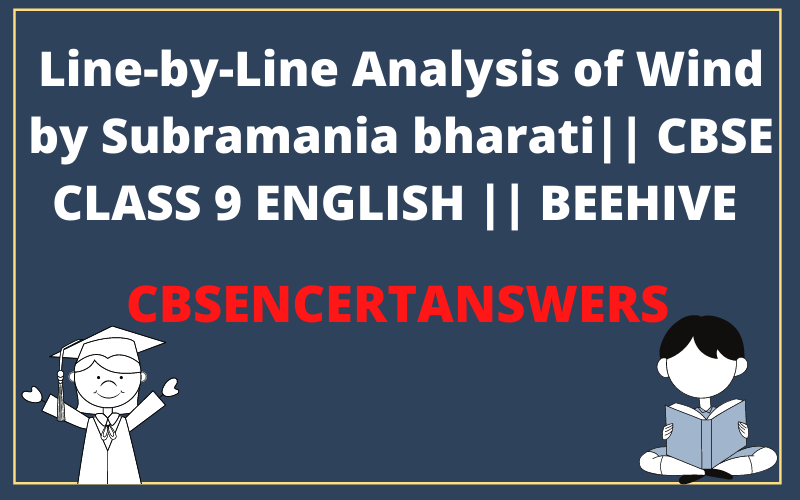Line 1-8
Wind, come softly. Don’t break the shutters of the windows. Don’t scatter the papers. Don’t throw down the books on the shelf. There, look what you did — you threw them all down. You tore the pages of the books. You brought rain again. You’re very clever at poking fun at weaklings.
In the first eight lines of the poem, the poet talks to the wind. He asks the wind to come softly, subtle and in a comforting manner. He depicts the wind to be very powerful and destructive in nature. It breaks the shutters of windows and scatters the papers. The devastating wind throws away all the books which are kept on the shelf. The poet politely asks the mighty wind to look at the destruction it had done and the mess it had created. The harsh, tough and vigorous wind shatters every weak and tiny object on its way and the insecure creations of nature get afraid and hurt. At the beginning of the poem, the poet is referring to the wind as a young child. He is saying that it should come softly just like a small child does. In the later part, we come to know that the wind is destructive just like youth, just like any young child who is arrogant and ignorant of one’s responsibilities and duties and becomes violent.
Line 9-12
Frail crumbling houses, crumbling doors, crumbling rafters, crumbling wood, crumbling bodies, crumbling lives, crumbling hearts — the wind god winnows and crushes them all.
In this paragraph, the word ‘Crumbling’ is repeated so many times to lay stress that everything crumbles in the face of a strong wind. So, the poet conveys that nothing in the world can stop a mighty wind from destruction. It leads to the breakage of everything. Houses which are weak, destroy. Doors which are weak fall, the beams on which the roof of the buildings are supported, they also break. All the wooden structures fall, all bodies of people perish away along with animals, lives, hearts. Everything that is weak reacts by falling down and breaking in the face of adversity. So, the poet is saying a weak person can never withstand adversity in life. The poet is addressing the wind as ‘wind god’, and he is saying that the powerful god of wind winnows which means weak people fall down and get crushed. So here, a comparison is made between wheat and people. Just like we winnow the wheat to separate the grain from the chaff, the wind god separates the strong people from the weak people. When there is a strong wind, all the things that are weak fall and get crushed.
Line 13-18
He won’t do what you tell him. So, come, let’s build strong homes, Let’s joint the doors firmly. Practise to firm the body. Make the heart steadfast. Do this, and the wind will be friends with us
The poet wants us to be friends with the wind i.e. the adversities and difficulties we face in our lives. He tries to tell us, no matter how many hardships we face, the world won’t stop turning because of us. Hence, we shouldn’t give up as well. Problems are a part of life. Without ups and downs in life, we are probably dead. Hence, we should be prepared at every point of our life to face the adversities. Likewise, we should build strong houses so that the mighty wind cannot break the doors down. We should make our life and heart firm and strong enough to not break easily. Once we start to feel powerful, the wind won’t stand as a piece of trouble in front of us.
Line 19-22
The wind blows out weak fires. He makes strong fires roar and flourish. His friendship is good. We praise him every day.
In the last four lines, the wind has been on a pedestal and is compared to God. He says that wind is God and we praise wind every day. He adds that everything that is weak gets finished off in the face of the strong wind. And all the things that are strong, flourish and grow to become stronger. By these lines, the poet gives us a very important message. He says that no matter how wrong our life goes, how many hurdles we face, we should be strong and never give up. We should stand strong, face and fight the challenges thrown by life. We should make ourselves physically and mentally strong to face these challenges. And once we are strong enough, we will overcome the challenges. And then, the wind won’t stand as a foe to us rather, we will become friends with the wind. And once we have faced challenges and adversities this life has to offer to us; we would understand that everything is equally important to grow in life.
Word Meanings
· Poking fun – Making fun of something.
· Weaklings – A person who is physically weak or frail.
· Crumbling – Breaking into small fragments.
· Winnows – Blow a current of air through (grain) in order to remove the chaff.
· Steadfast – Firm.
· Flourish – Prosper.
